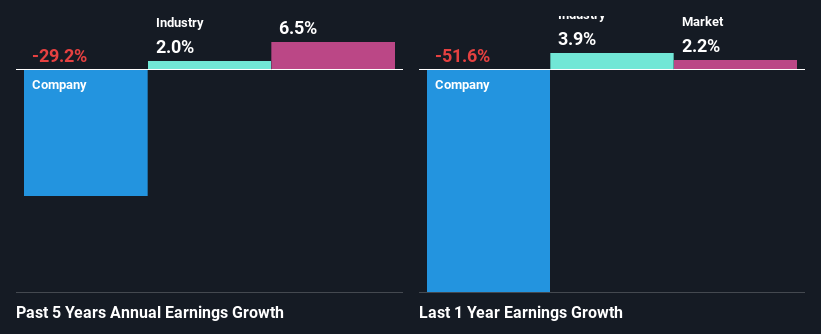
REF Holdings (HKG:1631) has had a great run on the share market with its stock up by a significant 218% over the last week. However, we decided to pay attention to the company's fundamentals which don't appear to give a clear sign about the company's financial health. In this article, we decided to focus on REF Holdings' ROE.
Return on Equity or ROE is a test of how effectively a company is growing its value and managing investors’ money. Put another way, it reveals the company's success at turning shareholder investments into profits.
How To Calculate Return On Equity?
Return on equity can be calculated by using the formula:
Return on Equity = Net Profit (from continuing operations) ÷ Shareholders' Equity
So, based on the above formula, the ROE for REF Holdings is:
7.1% = HK$5.7m ÷ HK$80m (Based on the trailing twelve months to December 2024).
The 'return' is the yearly profit. Another way to think of that is that for every HK$1 worth of equity, the company was able to earn HK$0.07 in profit.
Check out our latest analysis for REF Holdings
What Has ROE Got To Do With Earnings Growth?
Thus far, we have learned that ROE measures how efficiently a company is generating its profits. Based on how much of its profits the company chooses to reinvest or "retain", we are then able to evaluate a company's future ability to generate profits. Assuming everything else remains unchanged, the higher the ROE and profit retention, the higher the growth rate of a company compared to companies that don't necessarily bear these characteristics.
REF Holdings' Earnings Growth And 7.1% ROE
At first glance, REF Holdings' ROE doesn't look very promising. However, its ROE is similar to the industry average of 7.1%, so we won't completely dismiss the company. But REF Holdings saw a five year net income decline of 29% over the past five years. Remember, the company's ROE is a bit low to begin with. Therefore, the decline in earnings could also be the result of this.
However, when we compared REF Holdings' growth with the industry we found that while the company's earnings have been shrinking, the industry has seen an earnings growth of 2.0% in the same period. This is quite worrisome.

Earnings growth is an important metric to consider when valuing a stock. It’s important for an investor to know whether the market has priced in the company's expected earnings growth (or decline). This then helps them determine if the stock is placed for a bright or bleak future. Is REF Holdings fairly valued compared to other companies? These 3 valuation measures might help you decide.
Is REF Holdings Efficiently Re-investing Its Profits?
While the company did payout a portion of its dividend in the past, it currently doesn't pay a regular dividend. This implies that potentially all of its profits are being reinvested in the business.
Summary
Overall, we have mixed feelings about REF Holdings. While the company does have a high rate of reinvestment, the low ROE means that all that reinvestment is not reaping any benefit to its investors, and moreover, its having a negative impact on the earnings growth. Until now, we have only just grazed the surface of the company's past performance by looking at the company's fundamentals. You can do your own research on REF Holdings and see how it has performed in the past by looking at this FREE detailed graph of past earnings, revenue and cash flows.
Have feedback on this article? Concerned about the content? Get in touch with us directly. Alternatively, email editorial-team (at) simplywallst.com.
This article by Simply Wall St is general in nature. We provide commentary based on historical data and analyst forecasts only using an unbiased methodology and our articles are not intended to be financial advice. It does not constitute a recommendation to buy or sell any stock, and does not take account of your objectives, or your financial situation. We aim to bring you long-term focused analysis driven by fundamental data. Note that our analysis may not factor in the latest price-sensitive company announcements or qualitative material. Simply Wall St has no position in any stocks mentioned.